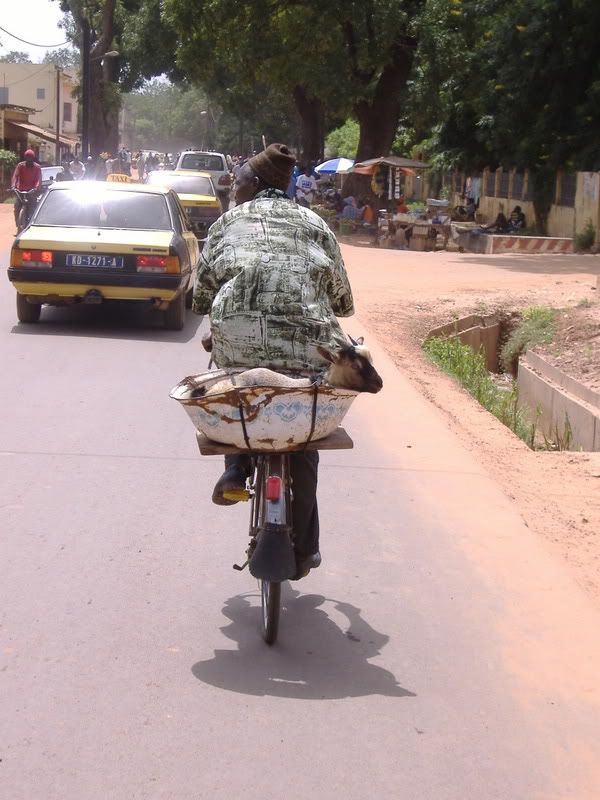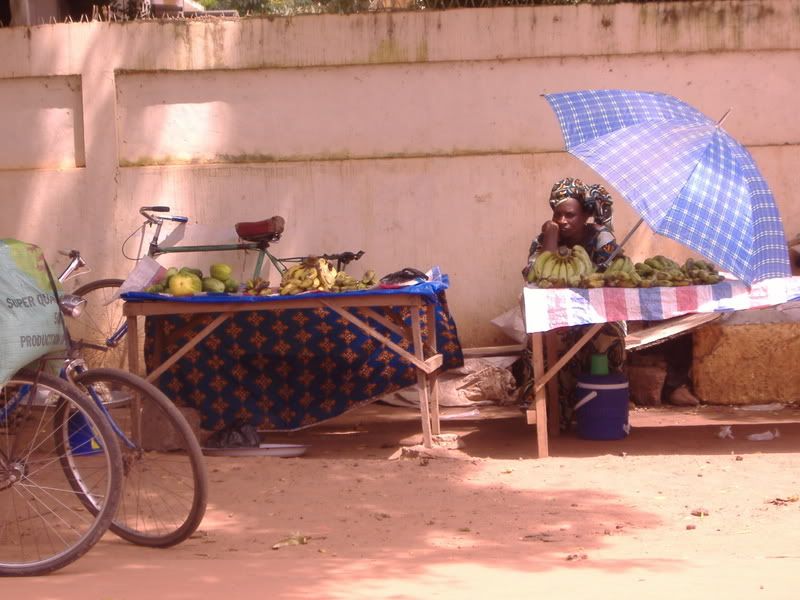Monday, October 30, 2006
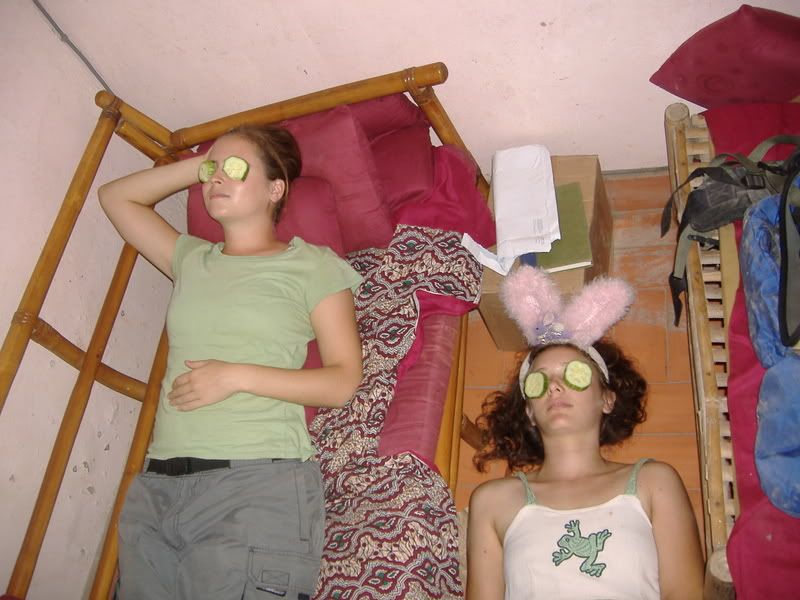
October 15, Sunday
Yesterday Jenny and I got together for some ocular
health, as pictured. Charlie took the photo, and after we looked at it, I
showed Jenny other pictures on my camera. She looked
at the cockroaches and told me she had the same
picture. I was stunned. I took the photo thinking I
was recording a rare instance of siamese twin
cockroaches. Nope. This is a photo of cockroaches
having sex.
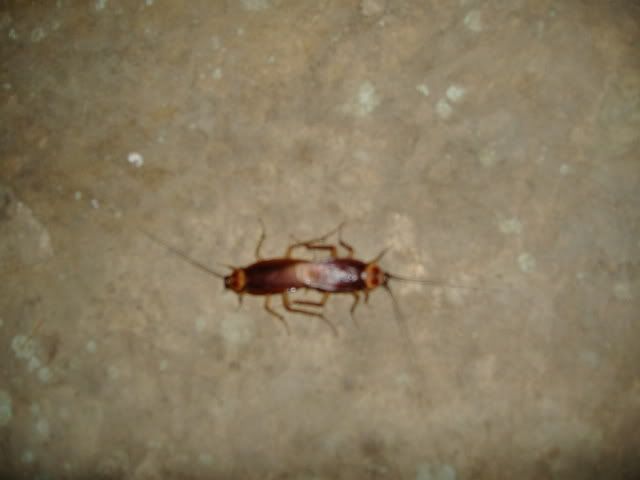
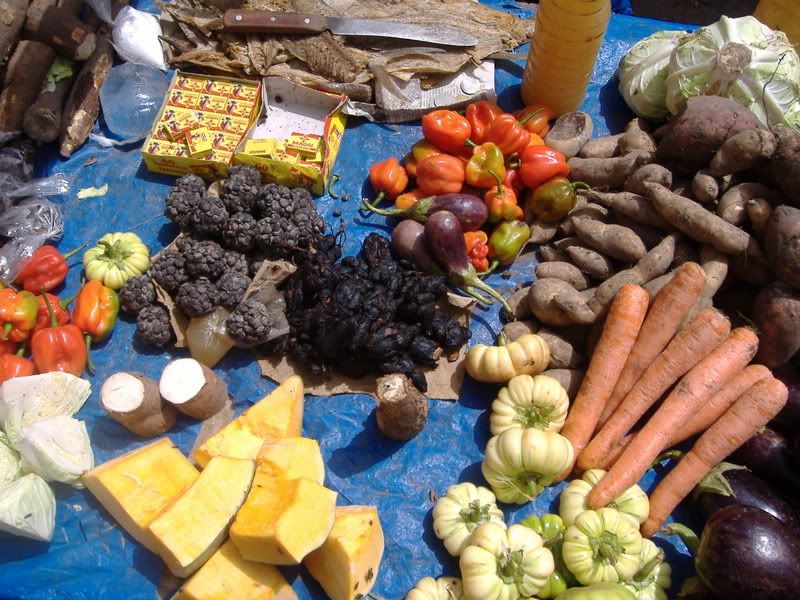
I have been lousy about updating my blog, and I am sorry. I have a list of things I want to write about,and soon I will, but wanting to do things in order has been preventing me from writing and posting on a whim,so, enough of trying to post chronologically.I recently went out on a photo taking expedition. I have been nervous about taking pictures of people, unsure of how adults would feel about being photographed and worried that, like at my house,children would swarm around me if I took out my camera in public. For the most part people were indifferent, the strong reactions I received were all extremelycheerful. The women I photographed at the market kept mooning for the camera and urging me to photograph this friend of theirs and that friend. One shy old women kept jokingly ducking her head under her skirt, peaking out at me with a mock-coy grin. The women made it festive, and then they gave me many vegetables for free. I do not know why. I wonder if they were happythat their images would go to the USA, pleased by my apparant interest in them, or simply enjoying the new element in their daily routine.

The market is a hectic, colorful, loud, fragrantplace. I confined my photos to the vegetarian sellers. People also sell fish out of buckets. I am always especially careful when I walk past the fish sellers,fearful that in the rush of people I might lose mybalance and land in the wet silver and red pile. Meatis cut straight off carcuses, and buyers can insist that the butcher pull a handful of fat off the meatbefore weighing it. I avoid these areas. In the vegetable area food is grouped and sold in piles. Three okra will make one pile of okra, and a pile costs 25 cfa. As pictured, oil is sold from a bowl.The vendor will fill a bag for you while you wait. The tan bags in that photo are peanut butter.
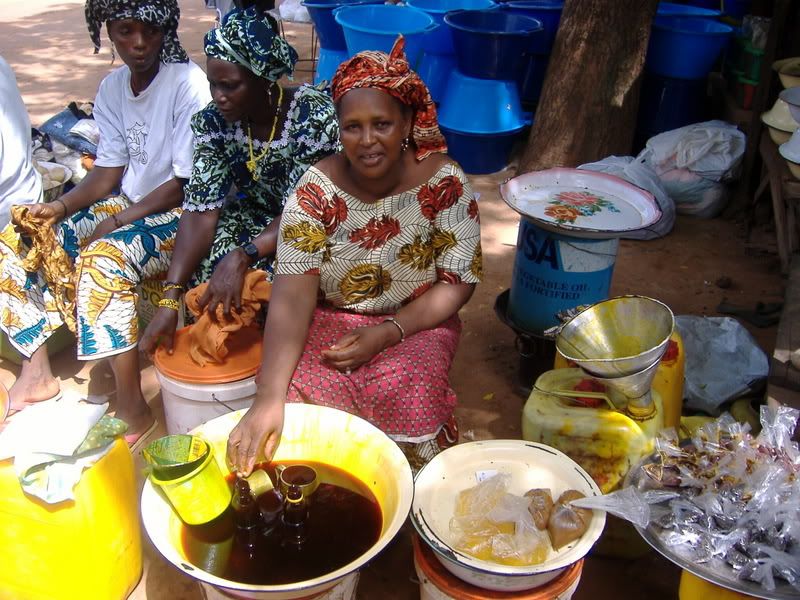
Bananas are often sold off heads. Please note that the woman photod is working with her baby on her back.
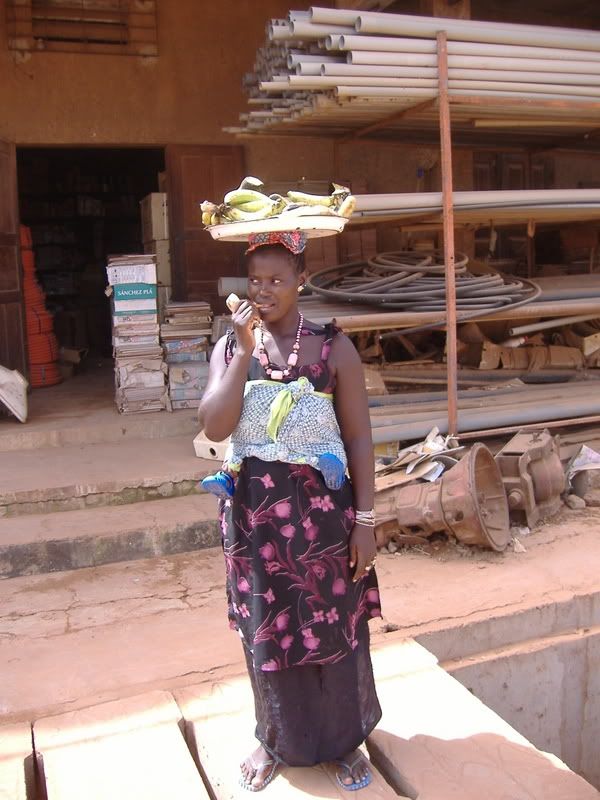
In addition to the inner market, which is tight and crowded, womenset up stands, buckets, or blankets on the sides of streets. With vegetables there is some room forhaggling price, but because so many women sell the same vegetables, often there is a set rate that will not vary. At first, the market place was an overwhelming universe that I strove to avoid. I know I must be acclimating, because now the market has a carnival feel for me. I am including a lot of photos of the market in hopes that this will help you get the feel of the place.
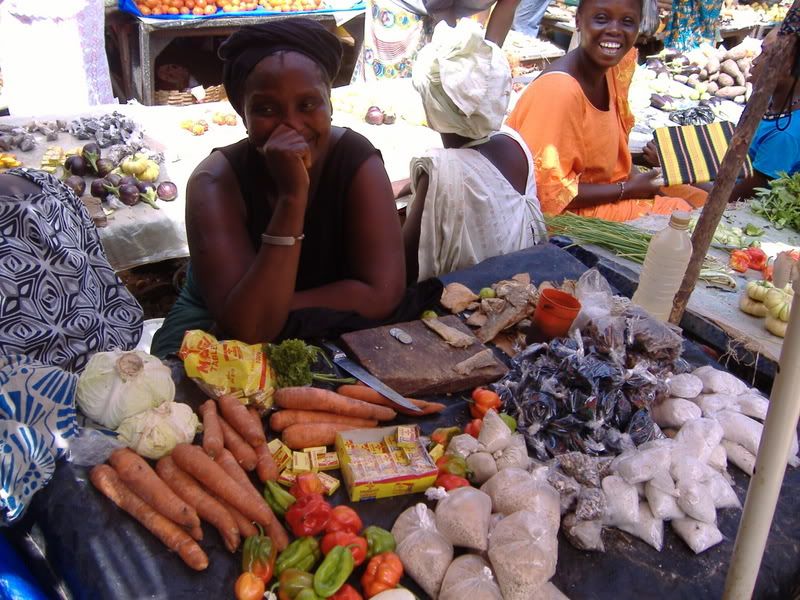
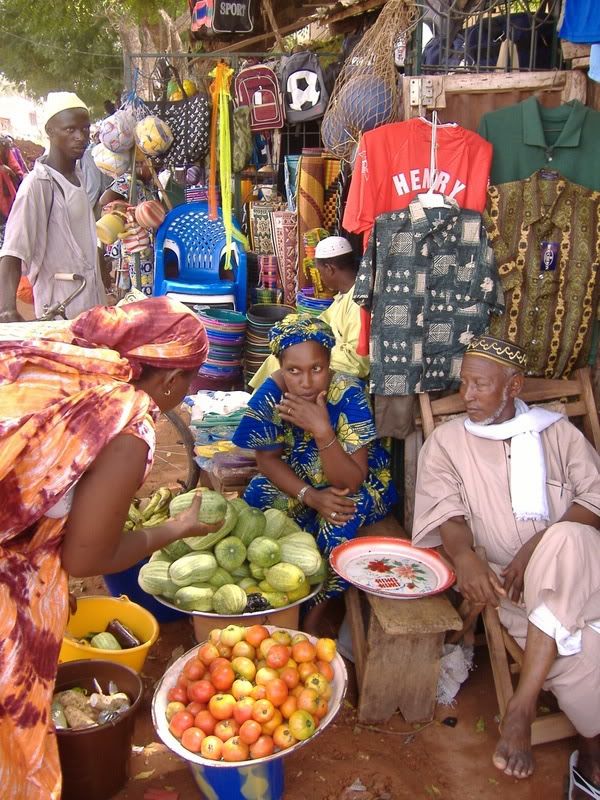
Wednesday, October 25, 2006
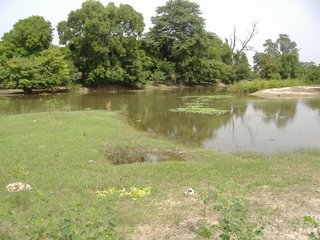
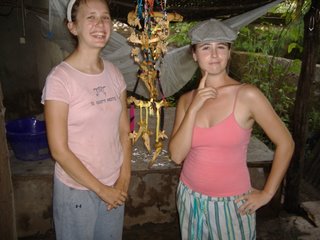
October 13, Friday
When Peace Corps first issued bicycles to my stage, I was disappointed to see that my bike had a platform in back instead of a front basket. During my first days in Thies I bought a long strip of black rubber: the Senegalese bunjee cords, good for tying down anything from a stack of books to a goat. I was nervous about using the back of my bicycle. The balance seemed precarious, and I thought it would be too easy for someone to swipe something behind my back. Slowly I have adapted, and now it is rare for me to not have a book, frisbee, a cat in a basket, or bottle of pesticide strapped on. Lately, however, I have had more interesting items.
The Halloween party is going to be held in Kolda. Part of my role in preparations is to collect bones. I have enlisted the help of a few Senegalese friends, giving them only the vague explanation that another volunteer wants bones and metal scraps for an art project. This seems more palatable than the truth, which is that I want to give party goers the option of constructing their own gris-grises (magical charms).
In the days after I returned to Kolda from Thies I spent a lot of time watching the river and clouds from a seat under a tree. A cow died near my sitting place, so I also got to observe a gathering of vultures. On Wednesday I counted the few bones I had picked off of roads and trash piles and realized this method of collection would leave the party sorely low on bones. So, I went to see about the cow.
The cow died off the path on a patch of land that, as the Casamance River rose in the rains, became completely submerged. The river has been dropping every day this week. I found the cow's skeleton sitting in very shallow mud. With red muck squishing onto my sandals and between my toes, I harvested. My bicycle has no kick stand, so I had to hold it with one hand while plucking up bones and placing them into the big bucket I had strapped onto my bike. Happily, between the vultures, the water, and the sun, the bones were essentially devoid of meat. A few vertebrae were held together by a cord, and the jaw bones were disarmingly black on their bottom sides, but otherwise the bones were clean.
When my bucket was full of wet, off-white bones, I began to carefully push my bicycle through the mud and back onto the path. I was almost back on the hard packed sand when I slipped, the bike tilted, and the bucket leanedon the rubber cord, stretching it until the bucket had tilted so much that all the bones had tumbled, clickety clack, to the ground. When I regained my balance I saw that the only thing left in the bucket was a collection of little black beetle-like bugs. I guess they had been inside the bones.
Talibes are little boys who study Islam and beg for money. They run around cities with empty tomato cans hanging from their necks. Many of them know all the volunteers by name. Their usual manner of blocking my way with an outstretched palm and a demand does little to endear them to me, but when a pack of talibes materialized on the path after I dropped my bones, they looked like skinny little angels. At my request, they put the bones back into my bucket. I thanked them profusely and put a big donation into the eldest's tomato can. I then tightened the rubber strap and walked the bike to the regional house, not daring to take a protective hand off of the bucket. At the house, I spread the bones on cement in the sun. In a few days I will turn them over, and some time afterwards I will soak them in bleach water.
After lunch I went looking for my little brother, Omar. We had had plans to go gather cow paddies together. It turned out he was sick, so Neenee found me another boy, Janka. He led me to a pasture that is rich with fresh brown paddies. Neenee had already established that I should give him some money for helping me. I decided to augment the agreed wage, and this gave me a cleaner conscience about standing back and watching as he and a few other kids filled the bucket. Cow paddies, especially the fresh steamy variety, are much heavier than bones, and the way I had tied the Senegalese bunjee cord to support the bones was not good enough to hold the new load. I barely had biked a meter before the bucket tipped. Out plopped my turds. It is good that I can bring laughter to old men sitting under trees.
Janka and the others refilled my bucket, and one of the old men retied the rubber strip. With the pastoral fragrance wafting off the back of my bike, I pedaled through town to the garden, where I put the manure in a rice sack and put the sack in a barrel of water. In a few weeks I should have a lovely batch of manure tea, and in the meantime, I have a patch of the garden where it is best to hold one's breath.
Nebedie trees have very nutritious leaves. Another volunteer told me that if I have an official request form, the government's garden service will give me young trees for free. I talked to Seck, my gardener, about this, and he wrote up a request for thirty trees. Yesterday I biked out to the government building and traded Seck's paper for a stamped official request. The man who helped me surprised me by speaking English. I asked where he had learned it, and when he answered I initially though I misheard. Israel! I asked in Hebrew if he spoke Hebrew, and he replied in kind. He was in Israel to study agriculture. He loved it there. Although Islamic himself, he spent most of his times with Jews, and he raved about how he found the Jews so open and warm. He was struck by how Tel Aviv is such an international and non-racist city.
At the government's tree garden I met Mamadou, the care-taker. He has thousands of young mango, papaya, orange, lime, neem, nebedie, and other trees. They are kept in sacks, and the sacks are in long rows and lines on the ground forming rectangles of bushy gatherings of leaves. They are waiting to be taken and planted. Mamadou selected fifteen of the best looking Nebedie trees and placed them in my bucket, telling me thirty would be too heavy to do in one trip. He also filled my purse with fresh limes.
I biked away happy to have seen such successful gardening and excited about the future of my trees. Almost as soon as I was out of sight of Mamadou's fence, the bucket, predictably, tipped over. Young Nebedie trees have long thin truncks. When they landed on the sand, many of these trunks bent about 150 degrees, placing them beside the sacks in which their roots were housed. A teen named Usmaan appeared out of nowhere, and he held my bike as I reloaded and restrapped. Then, after I took a few steps and the bucket fell yet again, he restrapped it on. He made it so tight that the round bucket became a rectangle.
Today I went back to Mamadou to get the rest of the trees. I told him of my troubles with the bucket. He responded by grabbing a machette and disappearing behind his hut. I heard him hacking at something, and he soon came back with a big Neem branch. He used his machette expertly, using only three swift strong strokes, to cut the branch into four shorter sticks. He lay them across the back of my bike and then tied the bucket on top of this new wide platform. My ride to the garden was brilliantly uneventful.
Nebedie trees are named such because they, "never die." When I got to the garden today I realized I had been an idiot in placing yesterday's trees by the chainlink fence; now those poor, very bent and scratched trunks, hold no leaves. Goats. Today I moved all the trees to a spot in the center of the garden, safe from the goats who wander around Kolda. Many of the tree sacks had long slices in them as a result of roots grown wide and the bumpy trip to the garden, so I had to transplant the trees into new sacks. As of this afternoon, nearly all the trees look terrible. It appears I may have done the impossible.
This evening I took my bucket off of my bike and went for a short ride, relishing the absence of tail-weight.
Post Script:
I wrote this entry a while back. The halloween party has been canceled. Nick's birthday was on the twenty-first, so Jenny and I used some of the bones to make the pictured wind chime. At first, my rabbit raising-and-slaughtering friend refused to touch the bones, despite the fact that I had bleached them. She confined her work to the cutting and braiding of fabric strips. But as the piece took shape she became more involved, and before we were through she was cramming a knot of fabric into a skull's nasal cavity. Nick loves his present. We will continue collecting bones and will make JennyHeatherWindchimes the most popular gift among volunteers across the country. I do not know how Nick's community has responded to the new decoration on his tree.
The manure tea is ripe, and I have begun feeding it to plants at the garden and at my house.
The Nebedie trees spent a few weeks doing a very impressive job of looking dead: leafless, brown, and leaning heavily. Evidently they disagreed with the transporting and the transplanting. However, true to their name, four trunks now have the start of leaves on them, and a Senegalese girl easily pointed to the places on many of the still barren trunks where she expects leaves to soon sprout. I am amazed.
September 26, Tuesday
Ramadan began on Sunday night with the spotting of the moon. I was biking through the market when the moon appeared. Everywhere, people were standing with their fingers and eyes pointing west towards the glowing sliver on the horizon. People in another part of town saw the moon Saturday night, so they have already started fasting. I hear the a good answer for why I am not fasting is, "haa joni, mi yii'aani lewro o." This means, "I haven't seen the moon yet."
I was going to fast, or at least I was going to try. Jenny did the entire fast last year, and she said it won her a lot of respect in her neighborhood, and it showed people how far determination can take a person; whereas they fast for religious reasons, they appreciated that she was doing it simply to be part of the community. Quite a few volunteers have said fasting last year, and then breaking fast with their neighbors, brought them closer to their communities. In the months leading up to Ramadan my family teased me sometimes by saying that because I live here I would have to fast whether I liked it or not, other times saying that while they fasted I would not be able to. I wavered between wanting to fast to prove that I could do it, and wanting to not fast to demonstrate that they can not control me. Ultimately, I decided to fast on the first day and then decide about the second day.
Yesterday morning I woke before sunrise, drank about two liters of water, cooked and ate a traditional Senegalese dish, and felt terrific. The pre-sun weather was cool, and I considered taking a walk. A cloud burst pursuaded me to stay home. Within an hour of sunrise I was explosively sick. I thought that maybe with all I had already drunk I could still get through the day, but it quickly became apparent that I would be wise to rehydrate. I spent the day weaving between my toilet and my bed, watching my temperature rise to 102. In the evening I spoke to Neenee. She asked about my diet and then laughed. She believes my breakfast did me in. I had made a peanut sauce out of raw peaunt butter. I had boiled the peanut butter, but she said that because I boiled it for less than an hour, toxins remained. I ran this by Jenny, and she disagreed. She has eaten plenty of raw peanut butter without any malaise. She says I was simply hit by the good old oral-fecal cycle that plagues so many of us in this land of no toilet paper and little running water. Maybe my peanut butter was old.
Today I don't feel up to fasting, and now that the possibility of doing the whole month is dashed, there is little appeal in depriving myself of food and water for all sunlit hours.
So far, people are not visibly tired or grumpy, even in the afternoons. However, come evening, my neighborhood erupts into party. I have been waking up at all hours of the night to the sounds of people eating and laughing.
